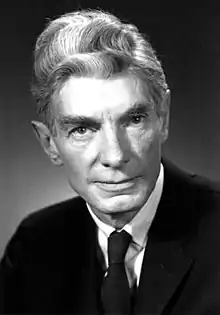Malcolm Moos
Malcolm Charles Moos (April 19, 1916 – January 28, 1982) was an American political scientist, speechwriter and academic administrator. He was a professor of Political Science at Johns Hopkins University for two decades. As a speechwriter, Moos wrote President Dwight Eisenhower's final warning about the influence of the military-industrial complex in 1961. Moos then served as the president of the University of Minnesota from 1967 to 1974.
Malcolm Moos | |
|---|---|
 | |
| President of the University of Minnesota | |
| In office 1967–1974 | |
| Preceded by | O. Meredith Wilson |
| Succeeded by | C. Peter Magrath |
| Personal details | |
| Born | April 19, 1916 Saint Paul, Minnesota |
| Died | January 28, 1982 (aged 65) Ten Mile Lake, Minnesota |
Early life
Moos was born on April 19, 1916, in Saint Paul, Minnesota.[1][2] He received his bachelor's and master's degrees in political science from the University of Minnesota.[3] He went on to receive his doctorate, also in political science, from the University of California at Berkeley.[4]
Career
Moos first taught at the University of Minnesota.[2] He was a fellow at the University of California and a research assistant at the University of Alabama.[2] He taught at the University of Wyoming in 1942, followed by Johns Hopkins University for 21 years.[3][2] He was also an associate editor of the Baltimore Evening Sun.[3]
Moos joined President Eisenhower's staff as a special assistant in 1957 and became his chief speech writer in 1958. Among the many speeches Moos wrote for President Eisenhower, he wrote Eisenhower's valedictory speech which warned of the influence of the military-industrial complex in 1961.[3]
Moos taught Political Science at Columbia University for three years and he worked for the Rockefeller family for two years.[3] He was director of policy and planning at the Ford Foundation from 1964 to 1967.[3]
Moos served as the president of the University of Minnesota from 1967 to 1974.[3] In 1967, Moos became the first native Minnesotan and alumnus to serve as a University of Minnesota president.[4] During his tenure, Moos faced the rise of Civil rights and anti-war protests.[3]
Moos was appointed as executive director at the Center for the Study of Democratic Institutions in Santa Barbara, California, in 1974.[2] He tried to run for the United States Senate as a Republican but failed to secure the nomination in 1978.[2]
Personal life and death
Moos married Margaret Tracy Gager, and he had five children.[2] He died in his sleep at his home in northern Minnesota in 1982.[2] He was said to have a heart condition.[1][5]
References
- "Ex-Ike Aide Dies". The Nashua Telegraph. Nashua, New Hampshire. January 29, 1982. Retrieved June 23, 2019.
- "Malcolm Moos, former 'U' president and Eisenhower aide, is dead at 65". Star Tribune. Minneapolis, Minnesota. January 29, 1982. pp. 1, 4. Retrieved June 23, 2019 – via Newspapers.com.
- Anderson, Dave (January 29, 1982). "Malcolm Moos, who lived in limelight, dies in solitude". The Minneapolis Star. pp. 1, 4. Retrieved June 23, 2019 – via Newspapers.com.
- "Malcolm Moos, 1967-1974". Office of the President. University of Minnesota. Retrieved June 23, 2019.
- Date information sourced from Library of Congress Authorities data, via corresponding WorldCat Identities linked authority file (LAF).